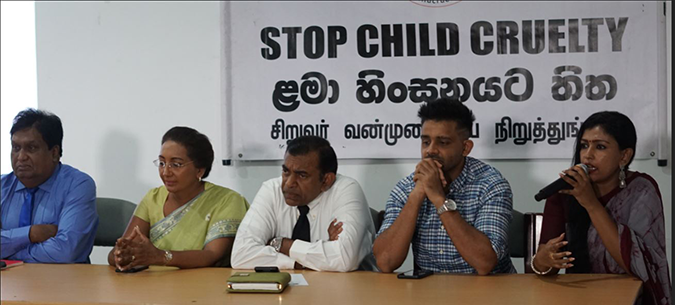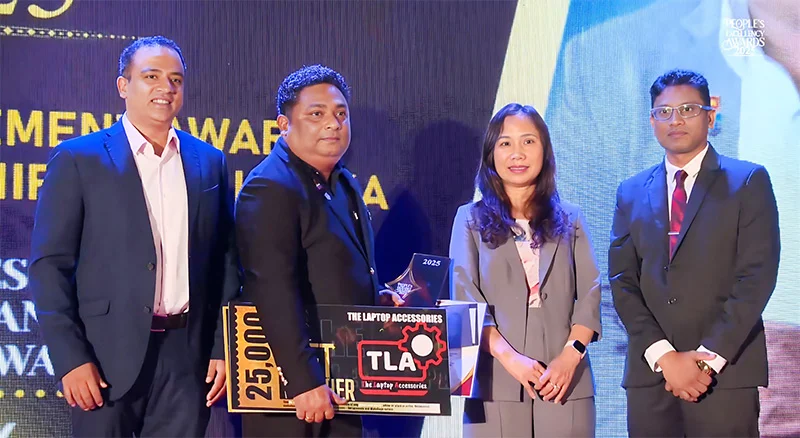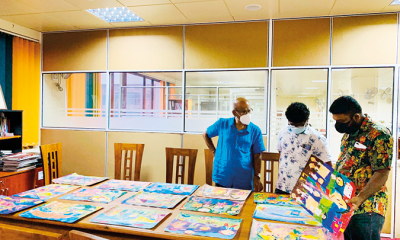Business
Children unite across the nation to appeal to parliament on Children’s Day

-
= Children are urging all 225 Members of Parliament to include child protection at the heart of their political agendas
-
= The child protection crisis is deepening in Sri Lanka, with an unprecedented rise in child murders; from July
Stop Child Cruelty Trust (SCC) together with Child Protection Alliance (CPA) will recommence the ‘Lama Surakum Yathra’ (Child Protection Tour) in celebration of Children’s Day to spread love to the people and children of the Northern Province. The intensive public awareness campaign will begin in Colombo Fort and will reach Jaffna on 1st October, Kandy on 15th October, Batticaloa on 29th October and Anuradhapura on 12th November.
The grand finale of Yathra is scheduled, for the 18th November 2022, with a walk in support of #NOguti and Sri Lanka’s first Children’s Convention on 18th November to celebrate Universal Children’s Day at the Open Air Theatre at Vihara Maha Devi Park, Colombo.
Speaking about the initiative, the Founder Chairperson of SCC, Dr Tush Wickramanayaka, said, “Although many protested on the streets insisting upon a better country for our children, they were silent about raising better, unwounded children for our country. Yathra is a journey of love to protect and promote children’s rights. In every key city, there will be a day of activities for children, focused on empowering them as rights holders and equal citizens, distributing essential educational material and sanitary pads for children with economic hardships and feeding the hungry via a community kitchen.”
The #NOhit zone school program launched in February 2022 was interrupted by the Aragalaya. “The violent oppression perpetrated by the Authorities is a poignant reminder that ending corporal punishment against children is a pressing need towards the dawn of a new era without violence and establish the just and peaceful country we envisage. We hope to introduce a beacon school in every province we visit on Yathra that promotes Happier and Safer Education”, expressed Dr Wickramanayaka. “A study on school disciplinary methods conducted by National Child Protection Authority in 2017 revealed that 80% of students reported having experienced corporal punishment in the past term. Cases of cruelty reported to NCPA have tripled in the past decade. The Supreme Court of Sri Lanka passed a historic verdict in February 2021 banning corporal punishment of children unequivocally, and it is critically urgent that the Government of Sri Lanka implements these directives to protect our children”, said Pof Prathiba Mahanamahewa, Former Commissioner of Human Rights Commission of SL and former Dean Law and Professor, University of Technology Jamaica.
Saranga Disasekara, Actor and Child Protection Ambassador said, “Our schools are supposed to be a safe space where children and educators can adopt pro-social behaviours that can prevent iolence within the school and in the community. However, if teachers and primary education providers are not aware of alternative punishment methods, the problem will remain and generation upon generation will be conditioned to normalize this heinous crime. I am happy to be part of the SCC’s #NOguti campaign that aims to change this behaviour.” Retd Senior DIG Priyantha Jayakody, speaking on the police’s reaction to child abuse said, “Most of the police officers are not concerned about the privacy of either victim or suspect. It is the responsibility of the police and the media to ensure that the correct approach is used when it comes to the basic rights of citizens irrespective of their involvement, specially to ensure that a child’s rights are always safeguarded. Therefore, I believe it is essential that long-term programs are created and implemented where we educate both the police and media on a strong code of ethics in this area.”
Niranjani Shanmugarajah, Actor and Child Protection Ambassador, speaking at the event said, “A child without love and support will never grow up with the attitude of caring for others or giving love to others. Let’s give love and nurture, let’s change the child’s world with love.”
The indefatigable efforts of SCC in ending violence against children have paved the path at the forthcoming UNHRC sessions to represent 5.2 million children in Geneva as the only Civil Society Organization committed to child rights. Child Protection is a collective social responsibility and SCC will continue its collaborative efforts to raise public awareness, training and advocacy. Those interested in getting involved in the cause can visit the website at www.stopchildcruelty.com and the Facebook page at ww.facebook.com/stopchildcruelty or email info@stopchildcruelty.com.
Business
Hemas posts resilient nine-month results

During the quarter, macroeconomic conditions reflected selective cost pressures alongside areas of stability, with a moderated net impact on the Group’s performance.
The Sri Lankan Rupee depreciated by 2.4%, driven by higher import-related foreign exchange outflows and cyclone-related economic disruption. This created some pressure on imported inputs, particularly in Consumer Brands and Healthcare, which was partially mitigated through pricing actions, procurement discipline and cost optimisation initiatives.
Monetary conditions tightened, with the Average Weighted Prime Lending Rate (AWPLR) rising by 89 basis points to 8.94%. The impact on the Group was contained due to its strong balance sheet, negative net gearing and disciplined funding strategy, limiting the effect on finance costs.
Inflation remained low at 2.1%, helping to contain operating cost escalation and preserve consumer affordability. In parallel, softer global palm oil and crude oil prices provided relief on input and energy costs, partially offsetting currency pressures.
In December 2025, the IMF approved US$ 206 million in emergency financing to support Sri Lanka’s cyclone recovery. Sovereign credit ratings were maintained during the period, supporting overall macro stability and business confidence.
Impact from Cyclone Ditwah
Cyclone Ditwah, which struck Sri Lanka on 25 November, was one of the most severe natural disasters experienced by the country in recent decades. The cyclone resulted in an estimated US$ 4.1 billion in direct economic damage—approximately 4% of national GDP—impacting homes, agriculture, infrastructure and livelihoods, with nearly two million people affected nationwide.
The Group’s manufacturing and service facilities did not sustain any direct physical damage, reflecting the effectiveness of proactive preparedness measures and robust business continuity frameworks across our operations. However, in the affected areas, the broader business ecosystems were significantly disrupted due to damage to personal assets, commercial premises, inventory losses, and disruptions to public transportation & logistics infrastructure, adversely impacting our employees, distributors and retail partners, including pharmacies.
These factors led to temporary supply-chain and distribution disruption during November and December, alongside a short-term deterioration in consumer sentiment. As a result, demand softness was observed during the latter part of the third quarter, particularly within the Consumer Brands and Healthcare sectors. Demand has since stabilised, with encouraging recovery trends evident, entering the fourth quarter.
In parallel, the Group mobilised a coordinated, multi-sector disaster response, working closely with government authorities, community organisations and local stakeholders. The Group committed approximately Rs. 30 million in financial and in-kind humanitarian assistance, focused on immediate relief for vulnerable communities. In addition, the Group has factored in Rs. 200 million for targeted support to small and medium enterprises across our value chain through extended credit terms, stock replenishment and business restoration initiatives. (Hemas)
Business
Aviyana Ceylon chairman Dr. Thisara Hewawasam wins 2025 People’s Award for Business Leadership

By Ifham Nizam
At a time when Sri Lanka is seeking to reposition itself as a premium tourism destination amid economic recovery and declining mass-market margins, Dr. Thisara Hewawasam, Chairman and Founder of Aviyana Ceylon, has been recognised with the 2025 People’s Award – Lifetime Achievement (VIP Category) for his contribution to business leadership and tourism-led economic transformation.
Dr. Hewawasam received the award at the 2025 People’s Awards ceremony held recently in Colombo, in recognition of his role in pioneering Sri Lanka’s first seven-star hotel project, Aviyana Ceylon, and for advancing globally competitive standards within the local hospitality sector.
The award was presented by Vietnam’s Ambassador to Sri Lanka Trinh Thi Tam, along with Parliamentarian Harshana Rajakaruna and Iconic Awards Director Asanka Athapattu, reflecting growing diplomatic and regional attention to Sri Lanka’s private-sector-driven growth narrative.
According to the official citation, the honour recognises Dr. Hewawasam’s leadership as a homegrown entrepreneur who translated long-term vision, discipline and innovation into a hospitality venture designed to compete at the highest international level. His work was acknowledged for strengthening Sri Lanka’s tourism brand while supporting national economic recovery through high-value investment, skills development and employment creation.
Crucially, the citation highlights that Dr. Hewawasam’s contribution extends beyond a single project. By positioning Aviyana Ceylon at the ultra-luxury end of the market, he has helped shift the national tourism conversation away from volume-led growth towards value-based tourism, a model increasingly viewed by policymakers as essential for improving foreign exchange earnings without overburdening infrastructure or natural ecosystems.
Industry analysts note that Sri Lanka’s tourism sector is at an inflection point, where attracting fewer but higher-spending visitors has become a strategic necessity. In this context, flagship developments such as Aviyana Ceylon are seen as confidence signals to international investors, demonstrating that locally led projects can meet global benchmarks in design, service quality and brand ambition.
The People’s Award—conferred only once in a recipient’s lifetime—serves as a public endorsement of leadership that delivers sustained national impact.
In recognising Dr. Hewawasam, the award highlights the growing role of domestic entrepreneurs in shaping Sri Lanka’s post-crisis growth model, particularly in sectors capable of delivering long-term foreign exchange stability.
Business
Corporate quarterly results continue to snag CSE vibrancy

The CSE commenced on a positive note yesterday but later the All Share Price Index slumped due to corporate quarterly results not reaching expected levels, market analysts said.
Amid those developments both indices indicated mixed reactions. The All Share Price Index went down by 103.17 points, while the S and P SL20 rose by 2.48 points. Turnover stood at Rs 3.55 billion with seven crossings.
Those crossings were: Tokyo Cement 2.58 million shares crossed to the tune of Rs 268 million; its shares traded at Rs 104, ACL Cables one million shares crossed for Rs 100 million; its shares traded at Rs 100, Cargills Ceylon 75000 shares crossed for Rs 54.7 million; its shares traded at Rs 730, LB Finance 302000 shares crossed for Rs 49.5 million; its shares traded at Rs 164, Tokyo Cement (Non-Voting) 570,000 shares crossed for 49 million and its shares traded at Rs 85.90, Seylan Bank 430,000 shares crossed for Rs 47 million; its shares sold at Rs 109.50 and HNB (Non-Voting) 70600 shares crossed for Rs 28 million; its shares traded at Rs 369.
In the retail market top seven companies that mainly contributed to the turnover were; Cargills Rs 206.6 million (283,000 shares traded), Renuka Agri Rs 153.5 million (9.6 million shares traded), ACL Cables Rs 148 million (1.45 million shares traded), Easter Merchants Rs 140 million (8.11 million shares traded), TJ Lanka Rs 109 million (2.8 million shares traded), Ceylon Land and Equity Rs 106 million (4.9 million shares traded) and Colombo Dockyard Rs 76.6 million (517,000 shares traded). During the day 158 million share volumes changed hands in 34681 transactions.
It is said that construction related companies and manufacturing and financial services related companies performed well. Top negative contributors to the ASPI were Senkadagala Finance (down Rs 68.50 at 837), Cargills (Ceylon) (down Rs 21 at 730), and Dialog Axiata (down 60 cents at Rs 32.70).
Yesterday the rupee was quoted at Rs 309.50/55 to the US dollar in the spot market, from Rs 309.43/50 the previous day, dealers said, while bond yields dropped significantly.
A bond maturing on 15.12.2029 was quoted at 9.45/55 percent.
A bond maturing on 15.03.2031 was quoted at 9.82/87 percent.
A bond maturing on 01.10.2032 was quoted at 10.15/20 percent, down from 10.17/21 percent.
A bond maturing on 01.06.2033 was quoted at 10.45/50 percent, down from 10.50/54 percent.
A bond maturing on 01.11.2033 was quoted at 10.60/62 percent.
A bond maturing on 15.06.2034 was quoted at 10.65/70 percent, down from 10.77/81 percent.
A bond maturing on 15.06.2035 was quoted at 10.72/75 percent, down from 10.95/98 percent.
An auction of Rs. 90,000 million Treasury bills is scheduled to take place today and an auction of Rs 51,000 million Treasury bonds tomorrow.
By Hiran H Senewiratne
-

 Features4 days ago
Features4 days agoMy experience in turning around the Merchant Bank of Sri Lanka (MBSL) – Episode 3
-

 Business5 days ago
Business5 days agoZone24x7 enters 2026 with strong momentum, reinforcing its role as an enterprise AI and automation partner
-

 Business4 days ago
Business4 days agoRemotely conducted Business Forum in Paris attracts reputed French companies
-

 Business4 days ago
Business4 days agoFour runs, a thousand dreams: How a small-town school bowled its way into the record books
-

 Business4 days ago
Business4 days agoComBank and Hayleys Mobility redefine sustainable mobility with flexible leasing solutions
-

 Business5 days ago
Business5 days agoHNB recognized among Top 10 Best Employers of 2025 at the EFC National Best Employer Awards
-

 Business17 hours ago
Business17 hours agoAutodoc 360 relocates to reinforce commitment to premium auto care
-

 Editorial7 days ago
Editorial7 days agoAll’s not well that ends well?
















